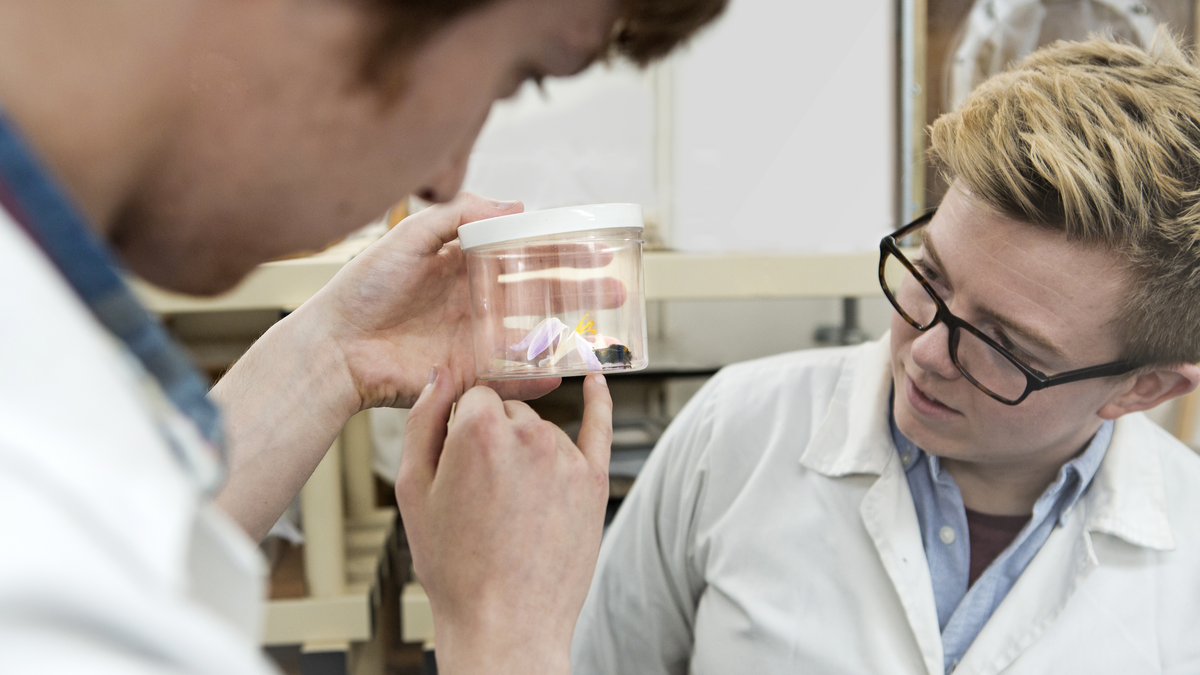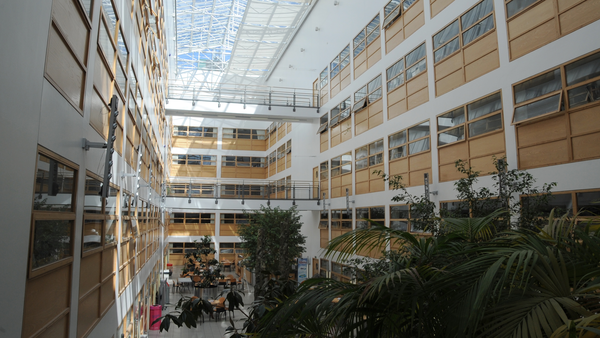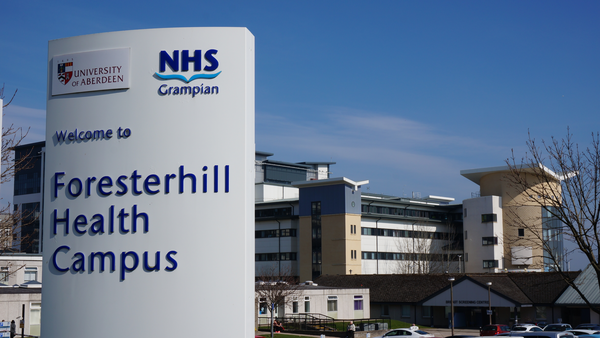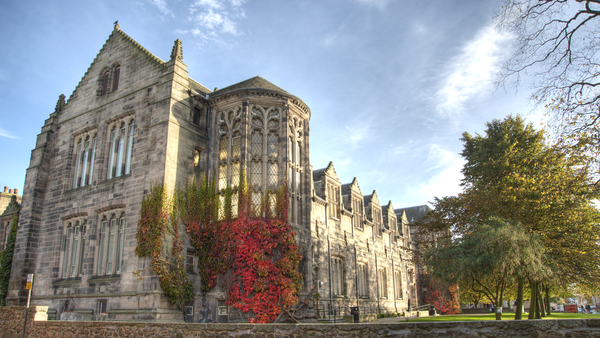Introduction
Physiology is one of the key disciplines underpinning our knowledge of medicine, dentistry and veterinary science.
We are ranked 2nd in the UK for Anatomy and Physiology in the The Times & Sunday Times Good University Guide 2025!
Study Information
At a Glance
- Learning Mode
- On Campus Learning
- Degree Qualification
- BSc
- Duration
- 48 months
- Study Mode
- Full Time
- Start Month
- September
- UCAS Code
- B120
- Pathway Programme Available
- Undergraduate Foundation Programme

Physiology is the study of how the body works. More than any other of the biological sciences, it involves using an understanding of biological process at the most basic level to explain how a whole organ or an entire body functions. It is this integrated aspect that puts Physiology at the centre of the biological and medical sciences.
Physiological studies of normal biological function provide the basis for understanding the abnormal function observed in human and animal disease and for developing new therapeutic treatments. The scope of physiology ranges from investigation of molecular actions in single cells to studying the way our body systems control our ability to think, eat, sleep and perform exercise. To achieve this, Physiologists must also use the related disciplines of anatomy, biochemistry, pharmacology, genetics and immunology.
5 year MSci degree
This degree offers you the opportunity to undertake a year's placement in an industrial, commercial or research environment and graduate after five years with an MSci (an undergraduate Masters degree) instead of a BSc.
What You'll Study
A degree in Physiology is taught via a selection of compulsory and optional courses to enhance your learning and prepare you for a future career or further study. In each year you will take courses adding up to 120 credits. Depending on the number of compulsory and optional courses offered by your degree, you can also choose other eligible courses which fit your timetable.
- Year 1
-
In year 1 you will take courses in Medical Sciences and Chemistry for Life Sciences plus additional courses selected from science and other areas.
Compulsory Courses
- Introduction to Medical Sciences (SM1001)
-
15 Credit Points
- Topics covered in this course span medical science through the ages; from ancient civilizations to the modern day science of genomics and synthetic biology.
- Alongside lecture material, in depth practical classes will cover biomedical measurement techniques, forensic science and a research-based mini project.
- Overall, this course is a journey through some of the key milestones that underpin the discipline of medical science we see today.
- Chemistry for the Life Sciences 1 (CM1020)
-
15 Credit Points
This course covers the foundations of chemistry that underpin the life sciences at a molecular level and is suitable for students with different backgrounds including little or no previous study of chemistry. The basic concepts of quantitative chemistry will be covered, along with the different types of organic molecules, acids and bases, and the principles of kinetics and thermodynamics. The relevance of the course materials to life science is emphasised throughout.
Laboratory classes introduce important practical techniques, with experiments that reinforce and complement the taught material.
The course will allow students to continue with other chemistry courses as part of their enhanced study by providing discipline breadth.
- The Cell (SM1501)
-
15 Credit Points
• Cells are the fundamental unit of life – without them life could not exist, and as such understanding how they function is crucial to our understanding of biology and medical science.• This course provides theoretical knowledge in a diverse range of topics covering the fascinating world of cells, from molecules like DNA, to how different cell types function within our bodies.• All practical classes are research based and will provide theoretical knowledge and skills training in many areas of molecular and cell biology.• Employability skills will also be explored through a highly interactive enterprise session and our online mini course.
- Chemistry for the Life Sciences 2 (CM1512)
-
15 Credit Points
Chemistry plays a vital role in the life sciences, explaining the properties of biomolecules and how biological processes work at a molecular level. Organic reaction mechanisms give insight into how different types of molecules can be synthesised and methods of chemical analysis introduce other important topics linking the chemical and life sciences. The relationship between energy, entropy and equilibrium in driving reactions will be covered and the course concludes with a survey of the molecules of life – proteins, enzymes and sugars.
Laboratory classes complement lectures by consolidating learning and developing problem-solving and hands-on practical skills.
- Getting Started at the University of Aberdeen (PD1002)
-
This course, which is prescribed for level 1 undergraduate students (and articulating students who are in their first year at the University), is studied entirely online, takes approximately 5-6 hours to complete and can be taken in one sitting, or spread across a number of weeks.
Topics include orientation overview, equality and diversity, health, safety and cyber security and how to make the most of your time at university in relation to careers and employability.
Successful completion of this course will be recorded on your Enhanced Transcript as ‘Achieved’.
Optional Courses
Select a further 60 credit points from courses of choice.
- Year 2
-
In year 2 Human Physiology courses commence. Parallel recommended courses include Biochemistry and Molecular Biology, combined with courses delivering key skills applicable to Physiology.
Compulsory Courses
- Physiology of Human Cells (BI20B2)
-
15 Credit Points
- Physiology is the science of understanding life. It allows you to explore and understand why your body does what it does and how it does it;
- This introductory physiology course explores living processes at the level of cells and molecules;
- The course lays down many of the fundamental concepts of physiology required to appreciate advanced study of many of the medical science disciplines;
- You will gain practical experience and understanding of electrophysiological techniques required for the study of electrically excitable tissues, like nerves and muscle;
- You will also gain valuable experience in the key skill of writing formal scientific reports
- Molecular Biology of the Gene (BI20M3)
-
15 Credit Points
- this course will provide a comprehensive understanding of how genetic information is stored, how it is accessed by the cell to form functional proteins and how the release of this information is controlled to produce a healthy human child;
- understanding this process is essential to understanding the basis of human disease and the course will examine how genetic differences affect disease susceptibility;
- this popular, comprehensive and cutting edge course will equip students with the essential knowledge, skills and confidence in molecular biology required to progress on all courses undertaken in the School of Medical Sciences
- Foundation Skills for Medical Sciences (SM2001)
-
15 Credit Points
- this course is the cornerstone to all the advanced science courses in later years and provides you with key skills for success in science;
- feedback from employers drove the course design to give specific and focused science skills to enhance your employability;
- numerical, analytical, data interpretation, experimental design and problem solving skills are core elements that are essential for any graduate career portfolio;
- this course and the additional specifically developed online resources have been commended by employers and students alike.
- Physiology of Human Organ Systems (BI25B2)
-
15 Credit Points
-
The Physiology of Human Organ Systems course aims to develop and integrated understanding of human organ structure and function through:
• innovative teaching approaches covering the digestive, cardiovascular, respiratory, renal and reproductive systems
• participation in practical classes where students act as subjects and investigators. These will reinforce lecture material, develop scientific acumen and build team working skills
• focussed and interactive problem solving sessions applying knowledge to clinical scenarios, and developing fundamental skills critically required in the final years of the degree;
• informal teaching sessions where one-to-one staff-student interactions encourage discussion in a non-threatening environment
-
- Energy for Life (BI25M7)
-
15 Credit Points
- understanding the fundamental workings of cells is important to a wide range of scientific disciplines;
- this course integrates the key metabolic and biochemical processes that underpin human, animal and plant life in relation to health and disease;
- this core knowledge prepares you for more advanced study in all areas of life sciences and has wide ranging applications;
- you will also participate in an award winning practical series focussed on drug discovery which will build essential employability skills in experimental design, data analysis and practical laboratory skills
- Research Skills for Medical Sciences (SM2501)
-
15 Credit Points
- this course cultivates literature research skills, building confidence in team-working and communication through scientific writing and seminar presentation;
- it encourages student-led learning and organisation in researching a topic on human health or disease of your own choice, with tutors providing guidance;
- you will learn to use online and library resources to search for information from primary research articles and relay that information in the form of a written report and a Powerpoint presentation to peers and academic tutors;
- these are all fundamental skills for scientific researchers, but are also transferrable talents for many other career pathways
Optional Courses
Select a further 30 credit points from courses of choice.
- Year 3
-
Courses taken in year 3 enhance your understanding of the major physiological systems within the mammalian body and provide detailed insights into specific areas of mainstream physiology.
Compulsory Courses
- Integrative Physiology (PY3002)
-
30 Credit Points
- this course integrates advanced physiological knowledge using examples from four different organ systems to help explain how these systems interact in health and disease;
- use of real-life clinical examples, diagnostic test data and a literature-based research project facilitates an enquiry and interest-based learning experience;
- with an aging population and ever-increasing number of people with complex diseases, you will appreciate why understanding how organs interact is the key to improving the diagnosis and treatment of various disorders;
- state-of-the-art practical classes measuring physiological functions delivers hands-on science and clinically-related skills to develop professional preparation and knowledge-based practice
- Cardiovascular Physiology and Pharmacology (BM3501)
-
15 Credit Points
- cardiovascular disease is the leading cause of death worldwide. Using teaching informed by high-quality research this course provides a comprehensive understanding of cardiovascular physiology and pathophysiology;
- you will learn how the knowledge of physiological processes is directed into identifying drugs targets for disease, which will improve your understanding of drug discovery;
- insight into the molecular and cellular action of drugs in the cardiovascular system will prepare you for your final year research project;
- wider transferable skills include problem solving, data interpretation and training in the ethical and safety aspects of recruiting human subjects in research.
- Neuroscience and Neuropharmacology (BM3502)
-
15 Credit Points
- during this course, you will start to appreciate why the diagnosis and treatment of various neurological and psychiatric disorders is both an art and a science;
- students will use real-life examples from case studies to help develop and demonstrate their knowledge and understanding;
- practical classes will enhance students understanding of why developing new neuropharmaceuticals is challenging and will improve their laboratory and analytical skills;
- this course will help students understand why multidisciplinary teams are essential in improving our understanding and treatment of neurological and psychological disorders;
- this course will improve your problem-solving, scientific writing, practical and data handling skills
- Epithelial Physiology (PY3803)
-
15 Credit Points
- This advanced course explores the essential role of epithelial cells in renal, gastrointestinal and respiratory function;
- You will gain valuable practical experience and understanding of the electrophysiological techniques required for study of epithelial transport;
- You will develop your writing, data analysis and reporting skills with the production of a detailed practical report;
- You will hone your critical analysis skills for the interpretation of published scientific material;
- You will prepare a presentation on a selected scientific paper, deliver it during a class-led symposium on cutting edge epithelial physiology research
- Neuroscience Research Topics (BM3804)
-
15 Credit Points
- the course outlines structural and functional alterations occurring in neuronal tissue during development, in the adult and in disease states;
- the course aims to identify and explain the mechanisms underlying these events and to provide an understanding of their functional consequences by building on the expertise of neuroscience researchers;
- you will gain cutting edge, in depth knowledge of nervous system development, function and the pathology of specific disease states affecting the nervous system;
- wider transferrable skills will be gained, such as scientific writing, problem solving, and practical assessment of nervous system function, thus developing graduate attributes and skills for employability
- Frontiers of Biomedical Sciences (SM3002)
-
30 Credit Points
- this course covers many of the core concepts which form the foundations for advanced study in Biomedical and related sciences;
- you will gain cutting edge, in-depth and focussed knowledge of cell function and cell signalling delivered in a research-driven environment in preparation for advanced study of similar material in the honours year;
- you will research a topic of choice and prepare a scientific review in a similar fashion to academic staff;
- problem solving exercises designed to illustrate the application of your knowledge in the wider world and advanced laboratory techniques are interwoven strands aimed at developing graduate attributes and employability
- Year 4
-
The Honours year aims to explore in depth, specific aspects of physiology. An important feature is the ten-week research project, carried out in research laboratories at the University or in local research institutes.
Compulsory Courses
- Advanced Molecules, Membranes and Cells (BM4004)
-
30 Credit Points
- the core professional knowledge you need, to be able to contribute to research-level biomedical science, especially in fields of pharmacology and physiology;
- active research scientists explain the latest developments in our understanding of brain function in health and disease, hormone and steroid signalling systems, epithelial biology and cellular homeostasis;
- small group practical classes in working laboratories introduce core research and data analysis techniques;
- research scientists present in depth material on core research techniques – transgenic animals, genome editing, biological imaging, patch clamp analysis and omic technologies
- Staying Alive - Adaptation in Physiological Systems (BM4009)
-
15 Credit Points
- this course integrates knowledge of physiological systems within the context of physiological adaptation to the environment;
- you will understand advanced physiological concepts which regulate every aspect of human survival and the life cycle;
- our bodies also adapt to disease and you will examine the physiological changes which occur throughout several major clinical conditions including diabetes, osteoporosis and heart disease;
- the ability to measure important physiological parameters will also be taught in interactive practical classes;
- advanced problem solving in tutorials will provide you with the skills required to tackle complex physiological problems at a research level
- Medical Science Data Analysis Paper (SM4901)
-
Data Analysis examination paper exclusively for students taking Medical Science degree programmes.
- Medical Science General Essay Paper (SM4902)
-
General Essay examination paper exclusively for students taking Medical Science degree programmes.
- Medical Sciences Honours Research Project (SM4501)
-
60 Credit Points
- Final year Honours project offers an excellent opportunity to carry out cutting-edge literature or lab-based scientific research.
- With projects from disciplines throughout the School of Medicine, Medical Science and Nutrition to choose from, this is an opening to follow your interests working with staff and leading researchers.
- The project forms the zenith of your degree and fosters development of the skills and knowledge gained throughout your degree, as well as heightening analytical and critical thinking abilities.
- The opportunity to be part of a novel, yet-to-be published research project can be career-defining and provides experience to prepare you for the future.
Optional Courses
Select one of the following:
- Developmental Neuroscience (PY4302)
- The Science of Ageing - From Cradle to Grave (BM4301)
- Developmental Neuroscience (PY4302)
-
15 Credit Points
- ever wondered where your brain comes from?;
- this course merges cutting edge developmental biology, neuroscience, and cellular physiology to describe how the nervous system arises and gets wired up;
- the bewildering arrays of cells in the nervous system interconnect in highly specific ways. Here you will learn what dictates neuronal cell fate, how neurons find appropriate partners and how cells communicate to generate behaviour;
- in addition to lectures from dynamic researchers this course will hone core skills for basic scientists and medics through group presentation work, independent library research and scientific writing
- The Science of Aging - from Cradle to Grave (BM4301)
-
15 Credit Points
- this course integrates advanced physiological concepts across the continuum of life;
- fundamental biomedical scientists meet with advanced clinical practitioners to facilitate an enquiry and interest based learning experience;
- with an aging population and ever increasing number of children with complex health challenges, you will be prepared to progress along a range of careers threads and understand the dynamic interplay between individuals and their changing physiological, psychological, pharmacological and biochemical needs for lifelong health and wellbeing;
- state of the art practical classes deliver hands on science and clinical skills to develop professional preparation and knowledge based practice
We will endeavour to make all course options available. However, these may be subject to change - see our Student Terms and Conditions page.
How You'll Study
You will be taught using a variety of methods and styles and we continually seek to make the teaching engaging, exciting and responsive to the latest research in your subject area. The research we carry out in the School directly informs and guides our teaching, particularly in the final Honours year. Our commitment to teaching is recognised by the range of University of Aberdeen Student-led Teaching Awards given to staff from our School.
As a student, your learning is supported by MyAberdeen, our virtual learning environment from which you can access the lecture Powerpoint slides, online practice tests, links to related reading, and tutorial support material.
We make innovative use of 'educational voting' handsets in class, remote control 'clickers' that allow each and every student to electronically respond in class by anonymous vote to questions posed by the lecturer.
Your academic development is supported from year 1 through to year 4 by an assigned personal tutor, who acts as adviser and mentor throughout your University career.
Learning Methods
- Lab Work
- Lectures
- Seminars
- Tutorials
- Workshops
Assessment Methods
Students are assessed by any combination of three assessment methods:
- coursework such as essays and reports completed throughout the course;
- practical assessments of the skills and competencies learnt on the course; and
- written examinations at the end of each course.
The exact mix of these methods differs between subject areas, year of study and individual courses.
Honours projects are typically assessed on the basis of a written dissertation.
Why Study Physiology?
- The programme provides you with the scientific content of pre-clinical medicine plus the opportunity to study cellular processes from this whole-body perspective.
- We are located within the Institute of Medical Sciences which allows a high degree of integration on this programme, both in research and teaching, between the medically related sciences.
- Scientists at the University of Aberdeen have made major advances in physiological sciences. These include the co-discovery of insulin and the discovery that the brain produces its own morphine-like substances – the enkephalins and endorphins.
- You will acquire core skills and knowledge vital to the modern workplace which will also provide you with the ideal training for progress to graduate programmes in medical research, medicine, dentistry and other healthcare professions.
- You will receive training in both specialist and employment-related skills.
Entry Requirements
Qualifications
The information below is provided as a guide only and does not guarantee entry to the University of Aberdeen.
General Entry Requirements
- 2024 Entry
-
SQA Highers
Standard: AABB*
Applicants who have achieved AABB (or better), are encouraged to apply and will be considered. Good performance in additional Highers/ Advanced Highers may be required.
Minimum: BBB*
Applicants who have achieved BBB (or are on course to achieve this by the end of S5) are encouraged to apply and will be considered. Good performance in additional Highers/Advanced Highers will normally be required.
Adjusted: BB*
Applicants who have achieved BB, and who meet one of the widening access criteria are are guaranteed a conditional offer. Good performance in additional Highers/Advanced Highers will be required.
* Including good performance in at least two Mathematics/ Science subjects by the end of your senior phase of education.
More information on our definition of Standard, Minimum and Adjusted entry qualifications.
A LEVELS
Standard: BBB*
Minimum: BBC*
Adjusted: CCC*
* Including good performance in at least two Mathematics/ Science subjects by the end of your senior phase of education.
More information on our definition of Standard, Minimum and Adjusted entry qualifications.
International Baccalaureate
32 points, including 5, 5, 5 at HL, with two Mathematics/ Science subjects at HL.
Irish Leaving Certificate
5H with 3 at H2 AND 2 at H3 including a minimum of H3 from two Science or Mathematics subjects.
Entry from College
Advanced entry to this degree may be possible from some HNC/HND qualifications, please see www.abdn.ac.uk/study/articulation for more details.
- 2025 Entry
-
SQA Highers
Standard: BBBB*
Applicants who have achieved BBBB (or better), are encouraged to apply and will be considered. Good performance in additional Highers/ Advanced Highers may be required.
Minimum: BBC
Applicants who have achieved BBC at Higher and meet one of the widening participation criteria above are encouraged to apply and are guaranteed an unconditional offer for MA, BSc and BEng degrees.
Adjusted: BB
Applicants who have achieved BB at Higher, and who meet one of the widening participation criteria above are encouraged to apply and are guaranteed an adjusted conditional offer for MA, BSc and BEng degrees.
We would expect to issue a conditional offer asking for one additional C grade at Higher.
Foundation Apprenticeship: One FA is equivalent to a Higher at A. It cannot replace any required subjects.
* Including good performance in at least two Mathematics/ Science subjects by the end of your senior phase of education.
More information on our definition of Standard, Minimum and Adjusted entry qualifications.
A LEVELS
Standard: BBC*
Minimum: BCC*
Adjusted: CCC*
* Including good performance in at least two Mathematics/ Science subjects by the end of your senior phase of education.
More information on our definition of Standard, Minimum and Adjusted entry qualifications.
International Baccalaureate
32 points, including 5, 5, 5 at HL, with two Mathematics/ Science subjects at HL.
Irish Leaving Certificate
5H with 3 at H2 AND 2 at H3 including a minimum of H3 from two Science or Mathematics subjects.
Entry from College
Advanced entry to this degree may be possible from some HNC/HND qualifications, please see www.abdn.ac.uk/study/articulation for more details.
The information displayed in this section shows a shortened summary of our entry requirements. For more information, or for full entry requirements for Sciences degrees, see our detailed entry requirements section.
English Language Requirements
To study for an Undergraduate degree at the University of Aberdeen it is essential that you can speak, understand, read, and write English fluently. The minimum requirements for this degree are as follows:
IELTS Academic:
OVERALL - 6.0 with: Listening - 5.5; Reading - 5.5; Speaking - 5.5; Writing - 6.0
TOEFL iBT:
OVERALL - 78 with: Listening - 17; Reading - 18; Speaking - 20; Writing - 21
PTE Academic:
OVERALL - 59 with: Listening - 59; Reading - 59; Speaking - 59; Writing - 59
Cambridge English B2 First, C1 Advanced or C2 Proficiency:
OVERALL - 169 with: Listening - 162; Reading - 162; Speaking - 162; Writing - 169
Read more about specific English Language requirements here.
International Applicants who do not meet the Entry Requirements
The University of Aberdeen International Study Centre offers preparation programmes for international students who do not meet the direct entry requirements for undergraduate study. Discover your foundation pathway here.
Fees and Funding
You will be classified as one of the fee categories below.
| Fee category | Cost |
|---|---|
| RUK | £9,250 |
| Tuition Fees for 2025/26 Academic Year | |
| EU / International students | £24,800 |
| Tuition Fees for 2025/26 Academic Year | |
| Home Students | £1,820 |
| Tuition Fees for 2025/26 Academic Year |
Scholarships and Funding
Students from England, Wales and Northern Ireland, who pay tuition fees may be eligible for specific scholarships allowing them to receive additional funding. These are designed to provide assistance to help students support themselves during their time at Aberdeen.
Additional Fees
- In exceptional circumstances there may be additional fees associated with specialist courses, for example field trips. Any additional fees for a course can be found in our Catalogue of Courses.
- For more information about tuition fees for this programme, including payment plans and our refund policy, please visit our Tuition Fees page.
Our Funding Database
View all funding options in our Funding Database.
Careers
A degree in Physiology has wide applications. Many students will continue in research posts, where the intensive project work in the Honours year provides particularly valuable experience. Students also go on to pursue postgraduate studies in medicine and dentistry. Others will go on to a more vocational medical related MSc in, for example, physiotherapy or dietetics. Alternatively, some students use the communication and analytical skills embedded in the programme to apply for non-science jobs in industry.
Our degree programmes are built to enhance your employability and three flagship options give our degrees a distinctively different flavour from many others. All our degrees offer:
- A 10-week full time research project in the final year which will provide you with valuable experience of working in a medical science research environment
- The option of an industrial placement year and graduation with an undergraduate MSci
- Highly relevant and sought after experience in bio-business aimed at giving you an understanding of the commercialisation of scientific ideas and an opportunity to learn about the biotechnology and pharmaceutical industries
Our Experts
- Programme Coordinator
- Dr Derek Scott
Information About Staff Changes
You will be taught by a range of experts including professors, lecturers, teaching fellows and postgraduate tutors. However, these may be subject to change - see our Student Terms and Conditions page.
Facilities
Our commitment to teaching is underscored by our recent re-build and modernisation of the teaching lab space dedicated to practical teaching.

The Institute of Medical Sciences
Focused on developing future effective therapies, the Institute of Medical Sciences houses nearly 400 researchers and support staff working on cutting-edge biomedical subjects aimed at understanding the human body's response to infection and disease.

Foresterhill Health Campus
The Foresterhill Health Campus is one of the largest clinical complexes in Europe which includes the Medical School, large teaching hospital, the Institute of Medical Sciences and the Rowett Institute.

Science Teaching Hub
Our state-of-the-art Science Teaching Hub provides students with a digitally focussed environment including advanced analytical tools, research-grade equipment and flexible laboratory spaces.
Find out moreDiscover Uni
Discover Uni draws together comparable information in areas students have identified as important in making decisions about what and where to study. You can compare these and other data for different degree programmes in which you are interested.
Get in Touch
Contact Details
- Address
-
Student Recruitment & Admissions
University of Aberdeen
University Office
Regent Walk
Aberdeen
AB24 3FX

